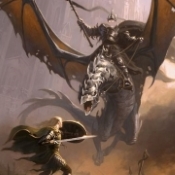|
MadScientistWorking posted:It doesnt Hyphz made it up. What I presume is the feat he is thinking of I didn't make it up, although it isn't quite exact. https://2e.aonprd.com/Feats.aspx?ID=1130 "For 24 hours after learning a prominent fact—such as the name of an NPC you have met, the details of your mission briefing, and similar information—you can recall it without attempting a check." Presumably implying that you'd otherwise have to make a check to remember what you were supposed to do.
|
|
|
|

|
| # ? May 27, 2024 16:31 |
|
hyphz posted:Yea, there's those as well. If you have PF2e munchkins you'll find that every character has mysteriously adopted the Dwarven culture in order to take Unburdened Iron (you can wear heavy armor with no speed penalty) because it's so much better than other Ancestry feats..
|
|
|
|
The Scrollmaster dedication is a specific role for the PF2 organized play system and it’s meant for players that want to be the book keeper, etc.
|
|
|
|
hyphz posted:I didn't make it up, although it isn't quite exact. OK, fair enough. I looked at the lists of feats from Lost Omens books to figure out what you were referring to, and it didn’t occur to me that it might be a dedication feat. That does seem like a pretty obnoxious “air-breathing mermaid” thing.
|
|
|
|
Bottom Liner posted:The Scrollmaster dedication is a specific role for the PF2 organized play system and it’s meant for players that want to be the book keeper, etc. I mean, maybe, but that description still implies that in organized play anyone who isn't a Scrollmaster has to make a check to remember the mission instructions they were told the previous day. On industry things: very strangely I saw a news story online about the apparent rise of the "second most popular RPG on Amazon in the UK". Storymaster's Tales. No, I'd never heard of it either, and it isn't actually the second most popular RPG on UK Amazon (that would be, unsurprisingly, Pathfinder 2e Player Core - also, just above Storymaster's Tales is System Mastery's Dungeonmeister: A Drink Master's Guide) hyphz fucked around with this message at 02:51 on Jan 11, 2024 |
|
|
|
dwarf74 posted:What, you don't want to pause the game while the wizard player does IRL math puzzles every round? The appropriate way to handle this is that the turns continue while the wizard does his math. If they're not done by the time their turn comes around again the spells fails. With how quickly combat turns take, they've probably got half an hour to work on it.
|
|
|
|
Bottom Liner posted:The Scrollmaster dedication is a specific role for the PF2 organized play system and it’s meant for players that want to be the book keeper, etc. Still seems like a pretty bad design tbh. It not only creates the air-breathing mermaid problem, it also reduces the need for the record keeping the player wants to take on. ETA: Plus on top of that as a DM I never want to make players remember some important quest hook or something, that's just a waste of everyone's time. By contrast I recently played a playbook in Stonetop, a PBTA game, that gave you a party-wide reroll every time you took session notes, that you could grant to anyone in the party. Something like that is a great implementation of that idea, because it rewards you for doing the task that benefits everyone but is kind of a pain.
|
|
|
|
Personally as someone with chronic memory issues, I tend to find all the eidetic memory and "Take this feat to have the DM remind you of something you might have forgot" feats and powers to be sort of insulting. I have memory issues, not my character. It's not that dissimilar from making a wheelchair-using player take a "working legs" feat.
|
|
|
|
hyphz posted:
I'm trying to think of actual feats that would fit your criteria and wouldn't be obviously just wrong. Old seasoned? Fireworks Technician? quote:Personally as someone with chronic memory issues, I tend to find all the eidetic memory and "Take this feat to have the DM remind you of something you might have forgot" feats and powers to be sort of insulting. I have memory issues, not my character. It's not that dissimilar from making a wheelchair-using player take a "working legs" feat. MadScientistWorking fucked around with this message at 14:19 on Jan 11, 2024 |
|
|
|
Yeah. "You remember everything" is way less problematic as a feat than "you don't have do a check to remember"
|
|
|
|
Ordinarily I would agree with you, but recently I've read two or three games where they put in the "For a resource you can have your DM remind you of something you might have forgot" function and then CALL that Eidetic or Photographic Memory, because it's a pat easy thing to call that feature.
|
|
|
|
theironjef posted:Personally as someone with chronic memory issues, I tend to find all the eidetic memory and "Take this feat to have the DM remind you of something you might have forgot" feats and powers to be sort of insulting. I have memory issues, not my character. It's not that dissimilar from making a wheelchair-using player take a "working legs" feat. Modelling “memory recall capability” is a thing you could do for characters as another attribute/dimension, but having it be “whatever the player has” rather than “whatever is to be expected of a heroic character in this setting”. We don’t make people do a deadlift(*) in order to use their 17 Strength, so I would key it off Intelligence if you wanted characters to have differences here for some reason that’s important to the game experience. A binary feat (especially one that leaves unstated what characters without the feat can do) is a terrible addition to anything. A feat to notice more subtle details about people or something, I could get behind. (*) except in the awesome LIFTS of course
|
|
|
|
Subjunctive posted:A feat to notice more subtle details about people or something, I could get behind. PF2 has that one too: https://2e.aonprd.com/Feats.aspx?ID=2113
|
|
|
|
theironjef posted:Ordinarily I would agree with you, but recently I've read two or three games where they put in the "For a resource you can have your DM remind you of something you might have forgot" function and then CALL that Eidetic or Photographic Memory, because it's a pat easy thing to call that feature. Sorry.
|
|
|
|
It sounds kind of like Common Sense in Vampire back in the day, IIRC. Basically, if you're about to seriously gently caress up, your storyteller will warn you ahead of time. You can easily imagine a throughline where you replace "being a fuckup" with "remembering something." However, when dealing with a person's real abilities, I can see how that could be unwelcome. Another way to look at it: If a character has a social situation in a game and the player makes some sort of a non-dice-roll error and are punished for it, that's typically normal or at least it was back in the day. However, this is odd when you think about it. A player isn't asked to move a milk crate full of textbooks to accomplish a strength test, so why aren't social and memory things looked at the same? I guess it's an artifact of more combative gamemastering; social and mental activities are seen as slightly less simulated so more is asked of the player's skills because it's actually a feasible request. I say it may be feasible but I don't think it's necessarily reasonable. fake edit: Beaten by Subjunctive.
|
|
|
|
Yeah, GURPS uses Eidetic memory as a potential advantage, which is true, it is an advantageous thing in most games to have it, but because of the player/character separation, it's hard to really get right. (GURPS also has an advantage called "lightning calculator" where you really are allowed to get a calculator out at the table to do math... yeah).
|
|
|
|
Magnetic North posted:Another way to look at it: If a character has a social situation in a game and the player makes some sort of a non-dice-roll error and are punished for it, that's typically normal or at least it was back in the day. However, this is odd when you think about it. A player isn't asked to move a milk crate full of textbooks to accomplish a strength test, so why aren't social and memory things looked at the same? I guess it's an artifact of more combative gamemastering; social and mental activities are seen as slightly less simulated so more is asked of the player's skills because it's actually a feasible request. I say it may be feasible but I don't think it's necessarily reasonable. Yes and no. I'm not a tactician or an experienced fighter. Is the game supposed to remind me that the spell I used or a maneuver in a fight is not the most optimal one and my character would have never done it? YggdrasilTM fucked around with this message at 16:36 on Jan 11, 2024 |
|
|
|
YggdrasilTM posted:Yes and no. I'm not a tactician or an experienced fighter. Is the game supposed to remind me that the spell I used or a maneuver in a fight is not the most optimal one and my character would have never done it? I think this got referenced earlier but: if there is an optimal choice then the game isn't likely to be super interesting. But more to the point: there is a difference between an error and something being non-optimal.
|
|
|
|
I think I get the point of the memory feat--it's fairly common in game that a player will forget some detail from a recent thing they were told and ask the GM for a reminder--"did the elf say to turn left or right at the branch?" It's pretty common to just call for an easyish INT or WIS check to be reminded of it by the GM, right. Feats that take a thing you normally need to roll for and make them 100% reliable feel way better to me than ones that give little +2 bonuses to specific rolls. This one is obviously pretty bad, though, obviously. It's also completely reasonable to not make people roll to remember details, and if they're spending a whole feat on it making it only work in such a short timeframe feels super stingy. If you're going to have utility feats, it really feels like they should be at the same power level of a low-level spell at a minimum. Magnetic North posted:Another way to look at it: If a character has a social situation in a game and the player makes some sort of a non-dice-roll error and are punished for it, that's typically normal or at least it was back in the day. However, this is odd when you think about it. A player isn't asked to move a milk crate full of textbooks to accomplish a strength test, so why aren't social and memory things looked at the same? I guess it's an artifact of more combative gamemastering; social and mental activities are seen as slightly less simulated so more is asked of the player's skills because it's actually a feasible request. I say it may be feasible but I don't think it's necessarily reasonable. I mean, moving things from being roleplayed out to just being a roll makes them a smaller part of gameplay. Making social encounters be keyed off of skill checks instead of the contents of what you say means that your game doesn't really have social challenges, in the same way that a game without combat (or that boils combat down into a single skill check) doesn't really have tactical combat challenges. It's perfectly okay to do that--purely roleplaying conversations out to resolve them means that conversations with NPCs become pseudo-puzzles that can be a distraction from the main focuses of the game--but one isn't better than the other. A Sherlock Holmes deduction-based detective game where you solving the mystery or not comes down to a skill check would be pretty boring, but in a hard boiled detective game where the actual gameplay is just getting wandering into a messy situation and seeing who you piss off maybe abstracting evidence collection and interpretation is fine.
|
|
|
|
OtspIII posted:I think I get the point of the memory feat--it's fairly common in game that a player will forget some detail from a recent thing they were told and ask the GM for a reminder--"did the elf say to turn left or right at the branch?" It's pretty common to just call for an easyish INT or WIS check to be reminded of it by the GM, right. Yeah but the player could also have just written it down so they wouldn't forget, which grants the advantage of the feat without costing character advancement
|
|
|
|
If I were going to make a memory-related power that required character build resources to buy, it would have nothing to do with actual player memory and actually be, like, some kind of limited scope license to rewrite setting details.
|
|
|
|
YggdrasilTM posted:Yes and no. I'm not a tactician or an experienced fighter. Is the game supposed to remind me that the spell I used or a maneuver in a fight is not the most optimal one and my character would have never done it? I mean, I think it would be kind of interesting to make that an ability or check a tactician-type character could make. It's got a lot of practical problems, of course, both in that the game usually doesn't know the best tactical move so your tip quality would depend on the GM's skill level, and that most tables allow table talk so you can usually ask fellow players for help regardless. So it'd probably be better suited to a video game, where you could have a character that could make a check to have the computer suggest a move, but there's honestly nothing wrong with it in concept, IMO. In a collaborative game like an RPG, having mechanics that let people reduce their engagement with the parts of the system they dislike or are insecure about seems fine to me. That said, that's also a complex task compared to something like remembering provided info that this feat covers, so it's the kind of thing most games would generally expect a check of some kind for. Also, a lot of games represent that sort of thing mechanically in other ways, like if you're playing a tactically-minded character in 4E there are a lot of powers specifically flavored around recognizing opportunities no one else does or what have you. I don't think anyone expects a tactician character to be so good at it that they're never surprised, or don't have access to all the information, or whatever, and you can pretty easily flavor a player messing up a move as that. Because again, we're talking about a complex situation under stress, not sitting in the tavern trying to remember what a guy told you a few hours ago.
|
|
|
|
The emergent take at the tables I play at is that if it's something blindingly obvious that happened six hours ago, and it's just that those six hours ago were a month and twenty beers ago out of game, you just ask the GM for a fact check: 'this guy is the Elven Duke, right?' I've never had it come up for MINOR details but at a certain point you may be building a case out of random set-dressing trivia. I can see that there might be intermediate details where some kind of check to see if your character recalls it would be useful. I would in fact have a memory power be auto-success on minor details and some way to lay down a bonus if you can fluff it right (remembering someone's subtle preferences; presenting a key detail in a court case; recalling EXACTLY where to shoot your arrow despite the lovely lighting)
|
|
|
|
|
Magnetic North posted:But more to the point: there is a difference between an error and something being non-optimal.
|
|
|
|
Remind your players of anything they remember they know: "What city did that elf say the Macguffin was in?" The characters have spent four days doing nothing but think about this MacGuffin, but it's taken your players three months of weekly play to role play those four days, outside of their jobs, other hobbies, families, and life. If your players ask you to repeat any info dump that you've given in a previous session and you don't, you're a lovely GM.
|
|
|
|
CitizenKeen posted:If your players ask you to repeat any info dump that you've given in a previous session and you don't, you're a lovely GM. As if I can remember what I said a week ago!
|
|
|
Jimbozig posted:As if I can remember what I said a week ago! Mostly I figure this is like the quest journal in a lot of video games (oh no!) which is in large part there to assist you if you have to take a break mid-session or are coming back to the game after a year. 'Ah, yes, I was delivering the Falcon to the duke.'
|
|
|
|
|
Tuxedo Catfish posted:If I were going to make a memory-related power that required character build resources to buy, it would have nothing to do with actual player memory and actually be, like, some kind of limited scope license to rewrite setting details. This has been a great way to handle it at any table I've been at that used it.
|
|
|
|
I'm with hyphz on this one. Remembering things is a quality of life feature and not something that should be gated behind a die roll. I understand that some people run the game like that, but they shouldn't. Adding the feat just encourages it.
|
|
|
|
Fabula Ultima has a memory skill that lasts you remember and re-investigate a scene
|
|
|
|
It's one of those things that's easily sorted out by remembering that your character isn't just you. They would remember poo poo. I personally take the concept a bit further and also never require players to RP more than they absolutely want to for any social rolls or scene or whatever because their character's charisma and intelligence scores aren't their actual life skill. But the memory one, that one sucks. 90% of the time in books it comes across as that specific tone of DM condescension that makes a lot of old games poo poo to read.
|
|
|
|
mellonbread posted:Remembering things is a quality of life feature
|
|
|
Jimbozig posted:As if I can remember what I said a week ago! Just get someone in your group who practically salivates at the thought of writing down everything that happens in a session. Pretty sure my friend has notes from every holiday adventure I've ran in the last eight years.
|
|
|
|
|
If I wanted to simulate “the character has better tactical knowledge than the player” I might let the player try something and then be allowed to roll it back as though they hadn’t once they see the results. The idea being that the tactical skill would have let the character anticipate the outcome, and then the player can decide to keep it or not.
|
|
|
|
not only is it a bad feat as a concept, it's bad at what it does b/c it has a built in time limit of 24 hours had to travel two days (and 5 sessions) to get the macguffin but forgot the name of the guy who sent you because it's been over a real-world month so the guardian won't give it to you? you're sol there, the feat does jack poo poo Red Metal fucked around with this message at 19:48 on Jan 11, 2024 |
|
|
|
My tactical character is so good at tactics that when she uses her advanced tactics skills, I literally declare that the scene setup is different in a way that is tactically advantageous for her and the GM changes things to suit. This has practicality limits, so instead of like redrawing the whole room we're fighting in to put the dungeon dressing in different places so our archer is in cover, I get to freely shift characters around, such as my allies or my enemies, by using my powers. We can roleplay that as shouting the enemy out of cover if we want to but we can also just handwave it as "this encounter is now broadly easier for our side because of the tactical acumen of our Warlord" and handwave the specifics that the reason it's easier is our warlock is now shooting from cover at the cultists who are now exposed. But unfortunately many games don't have mechanical support for such a thing. e. in fairness, 4e Warlord doesn't have that many powers that shift enemies and controller powers that do that more tend to have some kind of arcane backing. But there's games where players have a resource that lets them make declarations about the situation that put it to their advantage, and you can skin those as "my character is just better at battle tactics" even if you personally aren't. Leperflesh fucked around with this message at 20:03 on Jan 11, 2024 |
|
|
|
Magnetic North posted:It sounds kind of like Common Sense in Vampire back in the day, IIRC. Basically, if you're about to seriously gently caress up, your storyteller will warn you ahead of time. You can easily imagine a throughline where you replace "being a fuckup" with "remembering something." However, when dealing with a person's real abilities, I can see how that could be unwelcome. This is one of the oldest RPG debates, expressing itself through "Roll-play vs roleplay" or more modern games taking a "role, then roll" approach. If the point of the game is an interactive combat generation system, hand-waving social situations makes good sense; if it's roleplay, it may or may not make sense. That's something groups need to decide upon, ideally in ways where everyone gets to participate and not "everyone participates in combat but the non-social character just hide during social encounters." Old school, if someone was going to do something catastrophically bad, you'd hint at that as a GM. "Are you really sure you want to do that?" New school, which I think is better, can go so far as explaining precisely where the risks are. Two example of the old school approach: I had a PC in a long-running 1E campaign who was one of five priests of a particularly powerful deity and who decided to react to someone opening a portal to the Abyss by trying to cancel out the gate by opening a portal to his deity's home. What the player didn't know was that there was a 1% chance of a rival deity stepping through the Abyss portal, and that deity had spent the whole campaign trying to get access to the other deity (only two clerics in the whole world had the power to open this gate). It would have been reasonable to tell the player something the PC might have known or guessed; instead I announced that there was a 1% chance the campaign and game-setting ended and rolled dice in front of everyone. It didn't happen, and we proceeded; these days, I'm unsure whether that was dramatic and revealing a secret to players about the world, or a real dick move. Second example, I was playing in a pretty new online 5E campaign. We'd been forced to flee a fortress but left one of the PCs behind. One of the players wanted to go back for him, while the GM was repeatedly doing the "are you really sure you want to do that?" Everyone else fled, the one PC went back, and died. (The PC left behind was saved by an NPC we didn't know about.) The player whose PC died quit the campaign. If the GM had pulled out of the fiction for a moment and explained the situation, that might not have happened. Dick move, or "realistic?" My position on the more general principle in social challenges is that I'd prefer "roleplay, then GM decision about rolling." Two more examples: 1. 4E campaign. I'm playing a dwarf fighter. He's not a social character and usually doesn't participate in those situations, but every so often RP led me to make a contribution or an impassioned argument, in-character, because even a low CHA character can sometimes be persuasive. The GM always allowed me to say my piece, and then I had to roll an unproficient skill against escalating 4E DCs. No matter how appropriate the argument to the character as established through a hundred hours of play, I never got a bonus on the roll (perhaps the GM lowered DCs based on my RP without saying); I never had even a 50% chance to succeed and usually the results punished me for role-playing. In a 1-30 campaign I think I succeeded once. 2. Horror campaign (mixed Call of Cthulhu and White Wolf systems). I'm playing a Mythos Scientist, not good at social stuff. The adventure took us to a rural village where the locals have trapped a malevolent spirit which they've kept contained by sacrificing 12 cats and one young woman a year, the cats to maintain watch on the wards and the woman to distract and "entertain" the spirit. The villagers believed the spirit to be the Devil. We managed to sneak up to the containment area and my PC assessed that it was a fairly weak spirit, especially given how crude the wards were in design. But the ritual he needed to use to banish it took hours and could be easily disrupted. So we needed the support of the village elders, who were refusing to take the risk given their beliefs about the power of the spirit and that they barely knew us. I wasn't playing the persuasive character, but unbidden I started giving an angry speech, role-playing the character's anger that these elders insisted they knew better than people who had spent their lives studying, that this was worse than refusing modern medicine to villagers because they were actively murdering their own children and grandchildren, arguing that their real fear was that they'd done so without reason for decades and allowing the PCs to banish this thing would prove them wrong, and that they wanted to stop us from doing the right thing because they'd rather keep doing the wrong thing than admit they were wrong. He didn't mention the backstory stuff that was driving his anger, but it all came from that place. After a brief silence at the table (even I was a bit shocked at what this circumstance brought out from the character), the GM said, "Well, I don't think I'm going to require a roll after that. You succeed." 1 was irritating to me every time it happened and punished me for role-playing my character instead of saying "I'm low CHA, let the paladin and cleric handle this while I shut up and wait for a combat where I can 'Come and Get It' and then abuse my crit build." 2 is the main way I remember that PC and was the defining moment for him as a developed character after about two real-time years where he could maybe cast one spell a day and the whole party was helpless against a Mythos threat if it failed. (In that session, he poured power into the dismissal ritual and it just quietly worked.) Neither PC did much in most social situations, so this wasn't me constantly grandstanding or crowding out the other PCs, this was a match between a specific moment and the PCs as I was role-playing them. I'm playing a CHA character in a 5E campaign with the GM who ran the game in example 1. I do routine persuasion or lying all the time and then roll my die, and that's a good way to handle it. I think that PC has only had one or two moments like the ones above that emerged from RP: my favorite was cussing out Pholtus, whose ancient temple we were redeeming despite almost his entire priesthood being assholes to us, about letting us do all this work for him without anything beyond abuse from his followers. I think I did have to roll, but the god recharged a partially discharged Gem of Brightness as a result, and it felt like a triumph even though I wasn't trying to get anything at all, just playing the character being pissed at a deity and yelling at one of his statues. None of that is to discount that you can get amazing stories over improbable events that come out of critical success rolls. That's worth preserving in an RPG, too. As for tactical advice, I will offer rules advice, but not "this isn't a very effective approach," and here's an example why: one 2E/3E campaign I had a player who kept trying suboptimal combat maneuvers ("the enemy is a golem that looks like a Terminator robot? I'm going to shove it off this balcony so it falls 15' onto the next level down!"). He also had terrible dice-rolling luck, so often he'd try for a difficult maneuver that wouldn't accomplish much on a success, and then fail the roll. But in one combat, they were attacking the high temple of Death, who was holding hostages they wanted to rescue. Among the defenders was an ancient Deep Dragon they'd encountered twice before and escaped: it was always in polymorphed human form, wielding an artifact knife dedicated to Death and stalking after one PC at a time like a horror movie villain. Never said a word to them. He had his PC step up to the guy with a two-handed maul and he said "I'm going to disarm that knife." His strength was huge, and 3E offered another advantage for "big weapon in two hands versus small weapon in one." It was a sub-optimal play, obviously, and one the player might not have tried if I kept warning him about suboptimal plays. But he had something like a 12 point advantage on the opposed d20 roll and succeeded. And the dragon, who had been utterly controlled by the artifact and forced to carry it in-hand for over a century, was suddenly freed. It immediately left the combat, and later in the campaign provided the PC with assistance despite their alignment differences because it owed him for freeing it. If I'd trained that player out of his "suboptimal play" he wouldn't have succeeded at something that was optimal but that he didn't really know would be. He knew just enough to guess "this might do something good" and this time, he was really very right. When something unexpectedly awesome happens at the RPG table, let it!
|
|
|
|
Tuxedo Catfish posted:If I were going to make a memory-related power that required character build resources to buy, it would have nothing to do with actual player memory and actually be, like, some kind of limited scope license to rewrite setting details. Huh, I don't remember taking this Rashomon feat.
|
|
|
|
It’s just a nasty trade off. We’re playing PF2e’s Kingmaker campaign at the moment, but our roleplay centric player is highly frustrated because the rules for running the actual kingdom are not only totally busted (they basically admitted they weren’t playtested. Like, at all. Shameful) but they allow no scope for actually roleplaying diplomatic encounters. But at the same time, to do that you’d have to know the details of all the properties and intrigues and customs and personalities on either side. Plus the typical awkward gamer is in no way cut out to be a diplomatic negotiator, especially not a supernaturally good one.
|
|
|
|

|
| # ? May 27, 2024 16:31 |
|
hyphz posted:It’s just a nasty trade off. We’re playing PF2e’s Kingmaker campaign at the moment, but our roleplay centric player is highly frustrated because the rules for running the actual kingdom are not only totally busted (they basically admitted they weren’t playtested. Like, at all. Shameful) but they allow no scope for actually roleplaying diplomatic encounters. You... wouldn't, though. Or rather if you did you'd be playing in a very bad game. You can just make that poo poo up as you go. Either via knowledge/perception rolls, or spending in-game resources. player declares, "I want to spend X gold on welcoming them." GM: "hmm, okay. You know that the kingdom of Y is well-known for the lavish gifts they give to visitors." player: "excellent. I'll do that. We said earlier that this area's crafters were known for their textiles, right? So I'll commission some sets of court attire..." so on and so forth.
|
|
|





































